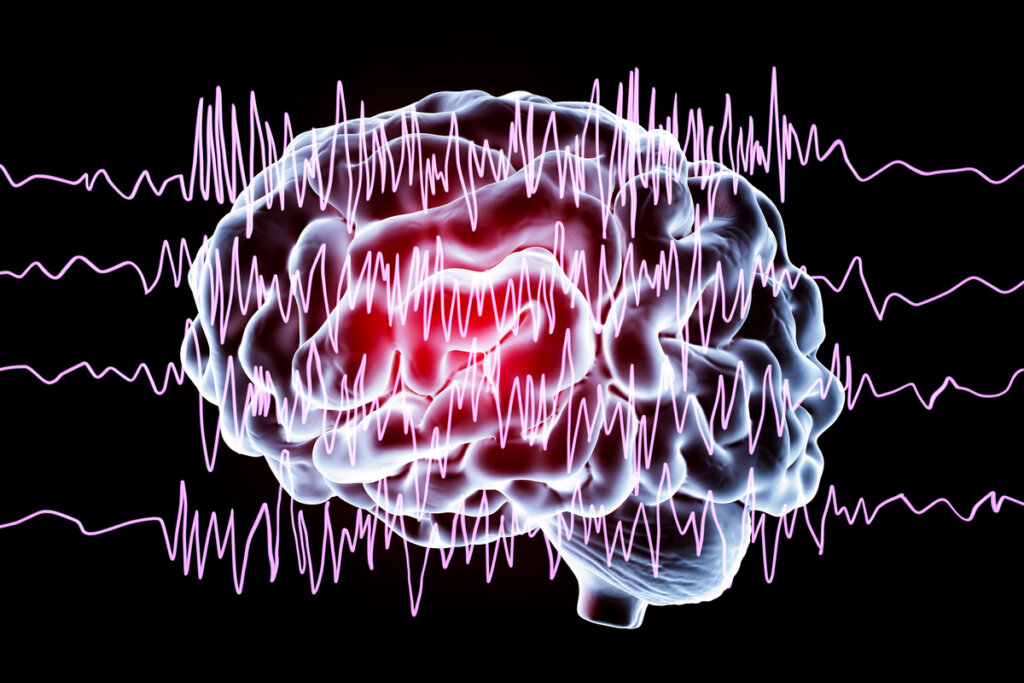What are you thinking right now? This won’t be an easy question to answer. That’s because your brain and everything that happens inside it is like a small factory in which multiple processes are carried out at the same time. Also, brain noise makes everything even more unpredictable and chaotic as a result of curious and striking fluctuations in electrical activity.
Neurons constantly chatter to each other. In fact, they sometimes even yell or whisper to each other. When neuroscientists record brain activity, they tend to come across these curious phenomena. They’re alterations in electrical fields, unexpected ups-and-downs in the internal activity that demonstrate that the brain is a really noisy organ.
Obviously, you don’t hear this cacophony or disturbance as such. However, this internal hyperactivity makes it easier for each task to be carried out effectively. The biggest problem arises with states like stress or anxiety. In fact, these are experiences in which your brain noise is intensified and alters many of your cognitive skills.
Your brain is never idle. Moreover, sometimes, even with your eyes closed, there’s a tremendous ‘noise’ in the visual areas. This is due to the intense electrical activity existing in that area despite the fact that it’s not used.
Brain noise
We understand brain noise as spontaneous fluctuations in the electrical activity of the neurons. It’s interesting to note that science has known about this phenomenon since the 1930s. Nevertheless, it’s still not yet fully understood.
Baylor Texas School of Medicine conducted a study on this topic. It claims that if scientists were to record your brain activity every time you looked at your favorite mug, they’d discover that your neurons don’t fire the same way every time. In fact, even if you do the same action thousands of times or expose yourself to the same stimulus, your brain activity is different each time. It varies, changes, and alters… This electrical unpredictability is brain noise.
However, what’s the reason for this variability? The explanation is in your changes in attention. For example, some days when you look at the mug, you remember something from your past. At other times when you look at it, you’re considering whether to add oat or cow’s milk to your coffee. In fact, your thoughts change every second. Therefore, the electrical activity in your brain also fluctuates with every different idea, sensation, memory, desire, etc.
Is brain noise completely unpredictable or does it follow some kind of pattern?
For a long time, researchers have considered that such fluctuations in electrical activity are chaotic and meaningless. In fact, that the circuits of the brain don’t always work in the same way, but they vary and change every moment and, in each change, a noise is emitted. It’s like listening to a badly tuned radio.
The neurologist Stanislas Dehaene is considered one of the great experts in the functioning of the brain. In his book, Consciousness and the Brain (2019), he suggests that spontaneous activity is actually one of the most common and overlooked characteristics of consciousness. Furthermore, he claims that there’s no chaos, but order and logic.
It must be remembered that the neural architecture of your brain has a non-linear and branched fractal geometry. Therefore, what happens in one specific area affects the others and vice versa. Brain noise is the sound that your neurons make talking to each other in order to be effective in each process and each small or large task.
To progress in the understanding of consciousness or artificial intelligence, you neeed to understand the fluctuations that appear in neurons and cause brain noise.
The brain has its own crazy ‘music’
This data is curious. Your body moves to the rhythm of your heartbeat and also of your breath. These are cyclical rhythms, known, predictable, and essential for survival. However, there are other sounds that are equally important for life that aren’t so rhythmic. This is brain noise, off-beat music that doesn’t follow any known pattern.
This fluctuating and highly complex ‘sound’ is orchestrated by your neurons. However, what generates these sounds and electrical disturbances? To understand it better, let’s visualize a neuron for a moment. In order to communicate with another neuron, it sends out a chemical called glutamate, causing the receptor to fire and thus creating arousal.
However, if a neuron releases gamma-aminobutyric acid or GABA, an inhibition occurs. In the midst of these cycles of excitement and inhibition, waves are formed that mediate your different mental states. All this generates a certain brain noise that’s combined with other inexplicable background sounds. Up until now, experts called this white brain sound, related to white noise.

Stress, the noise that alters everything
You live with constant brain noise but it doesn’t disturb you at all. In fact, this constant sound is nothing more than a clear reflection of the high connectivity between neurons. Remember that each neuron connects with about 10,000 others. All that connectivity results in about five miles of wiring within your brain. It’s fascinating.
As we already mentioned, you don’t perceive this internal brain sound and it doesn’t bother you. However, there’s a psychophysical state that completely alters your brain synchronicity and creates a disruptive noise. This is stress. It’s like being at a party and trying to talk to a friend. You can’t communicate with them due to the noise.
When you’re stressed, your brain stops processing information optimally. In fact, it’s difficult for it to focus attention and even your brain plasticity is inhibited. This is due to elevated levels of cortisol and other neurochemicals altering many of your basic functions.
Finally, you should remember that your brain is a fascinating organ. However, it’s extremely sensitive to your lifestyle and emotions. Make sure you pay attention to them if you want to maintain neurological harmony.
The post Brain Noise: What is It and How Does It Affect You? appeared first on Exploring your mind.



















Comments